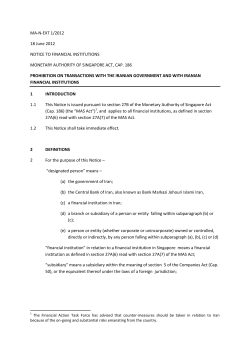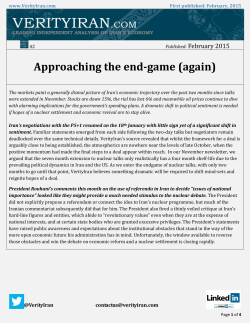
Iran Launches Fajr Satellite Into Space
New Generation of Saeqeh Jets ‘Pilgrims Attacked in Line With Zionist Goals’ TEHRAN (Tasnim) – Managing Director of Iran’s Aviation Industries Organization Manouchehr Manteqi announced on Monday that Tehran will soon unveil the second version of its homemade Saeqeh (Thunderbolt) fighter jet. An advanced model of Saeqeh fighter jet, named Saeqeh 2, will be unveiled in the near future as one of the latest achievements of Iran’s aviation industries, Manteqi said in a ceremony in Tehran. “The number of homegrown innovations employed in this aircraft is at least three times more than the previous one,” he added. TEHRAN (Press TV) -- Iran on Monday denounced the terrorist attack against Shia Lebanese pilgrims in Syria, saying the crime has been conducted in line with the goals of the Israeli regime and terrorist groups to take revenge on the resistance movement. “The main perpetrators of such crimes are those who are providing terrorists with logistic and financial support,” Foreign Ministry spokeswoman Marzieh Afkham said. Afkham also expressed deep concern over Al Khalifa regime’s intensified use of security approach toward Bahraini opposition, including its recent move to revoke the citizenship of dozens of dissidents. VOL NO: LV 9685 TEHRAN / Est.1959 Tuesday, February 3, 2015, Bahman 14, 1393, Rabi as-Sani 13, 1436, Price 10000 Rials 2U.S. Hints at Sending5 Viewpoint By: Kayhan Int’l Staff Writer The Last Stage of Imperialism Obama’s Remarks Confirm US Involvement in Ukraine Coup: Lavrov Troops to Iraq, Syria WASHINGTON (Dispatches) -- Wisconsin Gov. Scott Walker told ABC that he is not opposed to deploying American combat troops to Iraq. “I think aggressively, we need to take the fight to ISIL and any other radical terrorist in and around the world,” Walker said, during an interview on “This Week” said, adding, “we have to go beyond just aggressive airstrikes… and ultimately, we have to be prepared to put boots on the ground if that’s what it takes”. The U.S. and coalition members say they have launched more than 2,000 airstrikes against ISIL targets in Syria and Iraq since August 8, and have provided troops to help train and assist Iraqi and Kurdish forces on the ground. However, the attacks have failed to drive out ISIL terrorists from where they are holed in. In an interview at the end of September, President Obama acknowledged that the U.S. “underestimated” the gains ISIL was able to make in Syria in the midst of that country’s bloody four-year war. Obama, who officially ended the nearly nine-year Iraq War in 2011, stressed that the mission against ISIL is not America’s alone. “This is not America against ISIL, this is America leading the international community to assist a country with whom we have a security partnership with to make sure that they are able to take care of their business,” Obama said. In November, Obama authorized the deployment of up to 1,500 additional troops purportedly to serve in a non-combat role and help train Iraqi and Kurdish forces, nearly doubling the American military presence in the country. When pressed to clarify whether he was endorsing putting “U.S. boots on the ground in Syria,” Walker responded, “No, I don’t think that is an immediate plan,” but said “I wouldn’t rule anything out.” “I think when you have the lives of Americans at stake and our freedom-loving allies anywhere in the world, we have to be prepared to do things that don’t allow those measures, those attacks, those abuses to come to our shores,” Walker said. Outgoing Defense Secretary Chuck Hagel meanwhile said the United States might eventually need to send non-combat ground troops to Iraq. Hagel, who announced his resignation under pressure in November, told CNN all options must be considered in Iraq, including sending troops for non-combat roles such as gathering intelligence and locating ISIL targets. “I think it may require a forward deployment of some of our troops ...,” he said. “I would say we’re not there yet. Whether we get there or not, I don’t know.” Hagel’s comments echoed testimony by General Martin Dempsey, chairman of the Joint Chiefs of Staff, to Congress last fall when he said U.S. troops might have to take a larger role on the ground in Iraq. Such a deployment would be in addition to the 4,500 U.S. troops already committed to training and advising roles in Iraq. Hagel also said he had conflicts with White House officials on releasing prisoners from the U.S. detention facility in Guantanamo Bay, Cuba. As secretary of defense, Hagel authorized which prisoners would be released and when. He told CNN that the White House did not agree with his cautious approach, saying there were disagreements on “the pace of the releases”. Asked by CNN if he had been pressured, Hagel said, “we’ve had a lot of conversations” with the White House and Congress on the releases. 7 “Egypt Engaged in Talks on Importing Zionist Regime Gas” 8 ISIL Terrorism Approaching End Iran Launches Fajr Satellite Into Space The Safir rocket carrying the Fajr satellite rises into the sky after launch in central Iran. TEHRAN (Dispatches) -- Iran on Monday launched an observation satellite -- its first since 2012 -- with President Hassan Rouhani declaring it safely entered orbit and that he had personally ordered the mission. The Fajr (Dawn) satellite was placed 450 kilometers (280 miles) above Earth’s surface, said Al-Alam television, an Arabic-language station owned by the Islamic Republic. It is the fourth such satellite launch by Iran, after three others between 2009 and 2012. Iran’s space agency later said the satellite had begun transmitting data to its stations on Earth. The satellite is capable of staying in the space for 1.5 years and can taking and transmitting high-quality and accurate pictures to stations on earth. The satellite was locally made, said the official IRNA news agency, as was its launcher, according to Rouhani who noted that Iran’s aim was to have no reliance on space technology from abroad. “Our scientists have entered a new phase for conquering space. We will continue on this path,” Rouhani said in a short statement on state television. President Rouhani congratulated the nation on the successful launch of Fajr satellite and said the Iranian scientists have entered a new phase in space sciences. Al-Alam said the Fajr satellite would be able to take accurate pictures from space. The launch came as Iran started 10 days of celebrations for the 36th anniversary of the Islamic Revolution, culminating on February 11, “Victory Day” when the U.S.-backed shah’s reign officially ended in 1979. Defense Minister General Hussein Dehgan echoed Rouhani’s comments, stating that the launcher, named Safir-Fajr, shows “the ability of Iran to build satellite launchers”. In February 2010, Iran launched a satellite containing a rat, turtles and insects. Separate missions under Iran’s space program have seen two capsules launched. One, in January 2013, included a monkey that was recovered alive. The country is one of the 24 founding members of the UN Committee on the Peaceful Uses of Outer Space, which was set up in 1959. NATO, U.S. Weigh Arming Ukraine WASHINGTON (Dispatches) -- With pro-Russian fighters pressing their attacks in Ukraine, NATO’s military commander Gen. Philip M. Breedlove now supports providing weapons and equipment to Kiev’s beleaguered forces, and an array of U.S. administration and military officials appear to be edging toward that position, American officials said. President Obama has made no decisions on providing such lethal assistance. But after a series of striking reversals that Ukraine’s forces have suffered in recent weeks, the Obama administration is taking a fresh look at the question of military aid, the New York Times reported. Secretary of State John Kerry, who plans to visit Kiev on Thursday, is open to new discussions about providing lethal assistance, as is Gen. Martin E. Dempsey, the chairman of the Joint Chiefs of Staff, officials said. Defense Secretary Chuck Hagel, who is leaving his post soon, backs sending defensive weapons to the Ukrainian forces. Fearing that the provision of weapons might tempt President Vladimir Putin of Russia to raise the stakes, the White House has limited American aid to “non-lethal” items, including body armor, night-vision goggles, first aid kits and engineering equipment. But the failure of economic sanctions on Russia is pushing the issue of weapons back into discussion. Fueling the broader debate over policy is an independent report to be issued Monday by eight former senior American officials, who urge the United States to send $3 billion in arms and equipment to Ukraine, including anti-armor missiles, reconnaissance drones, armored Humvees and radars that can deter- mine the location of enemy rocket and artillery fire. Michèle A. Flournoy, a former senior Pentagon official who is a leading candidate to serve as defense secretary if Hillary Rodham Clinton is elected president, joined in preparing the report. Others include James G. Stavridis, a retired admiral who served as the top NATO military commander, and Ivo Daalder, the ambassador to NATO during Mr. Obama’s first term. “The West needs to bolster deterrence in Ukraine by raising the risks and costs to Russia of any renewed major offensive,” the report says. “That requires providing direct military assistance — in far larger amounts than provided to date and including lethal defensive arms.” Pro-Russians have captured the airport at Donetsk and are pressing to take Debaltseve, a town that sits aside a critical rail junction. All told, the pro-Russian fighters have captured 500 square kilometers — about 193 square miles — of additional territory in the past four months, NATO says. The assessment of some senior Western officials (Continued on Page 7) FM Zarif Discusses Expansion of Africa Ties TEHRAN (Press TV) – Iran’s Foreign Minister Muhammad Javad Zarif on Monday stressed the importance of improving relations with African countries, saying Africa has been a strategic partner for Tehran in regional developments. “The foreign policy of the Islamic Republic of Iran has always been based on very close ties with African countries,” Zarif told reporters after a meeting with Kenyan Foreign Minister Amina Mohamed in Nairobi. He added that Iran has always at- tached significance to ties with African states. The Iranian minister noted that he had exchanged views with his Kenyan counterpart about the “very complicated phenomenon of terrorism” and ways to boost bilateral cooperation. Zarif further said a comprehensive agreement with the P5+1 countries would safeguard all Iran’s nuclear rights, adding, “It (the deal) can also give the opposite side the assurance that Iran’s nuclear activities are peaceful.” Iran and the five permanent members of the UN Security Council – Russia, China, France, Britain and the U.S. – plus Germany have been holding talks to secure a final comprehensive deal over Tehran’s nuclear program. Since an interim deal was agreed in the Swiss city of Geneva in November 2013, the negotiating sides have missed two self-imposed deadlines to ink a final agreement. Iran and the P5+1 countries now seek to reach a high-level political agreement by March 1 and confirm the full technical details of the accord by July 1. The Kenyan foreign minister said her country has always maintained good and growing relations with Iran and hoped the two countries would further expand cooperation, particularly in oil and gas sectors. Mohamed also said Kenya recognizes Iran’s right to use nuclear energy for peaceful purposes. The Iranian foreign minister embarked on a diplomatic tour of four East African countries - Kenya, Uganda, Burundi, and Tanzania - at the head of a delegation on Sunday. The four-leg visit has been described as the beginning of a new chapter in Tehran’s ties with African countries. Iran already has a significant presence in agricultural and economic projects in some African countries and has been a major contributor to humanitarian missions in the continent over the past years. The intensified diplomacy on Africa is a sign of Iran’s willingness to engage deeper in African political (Continued on Page 7)
© Copyright 2025





















